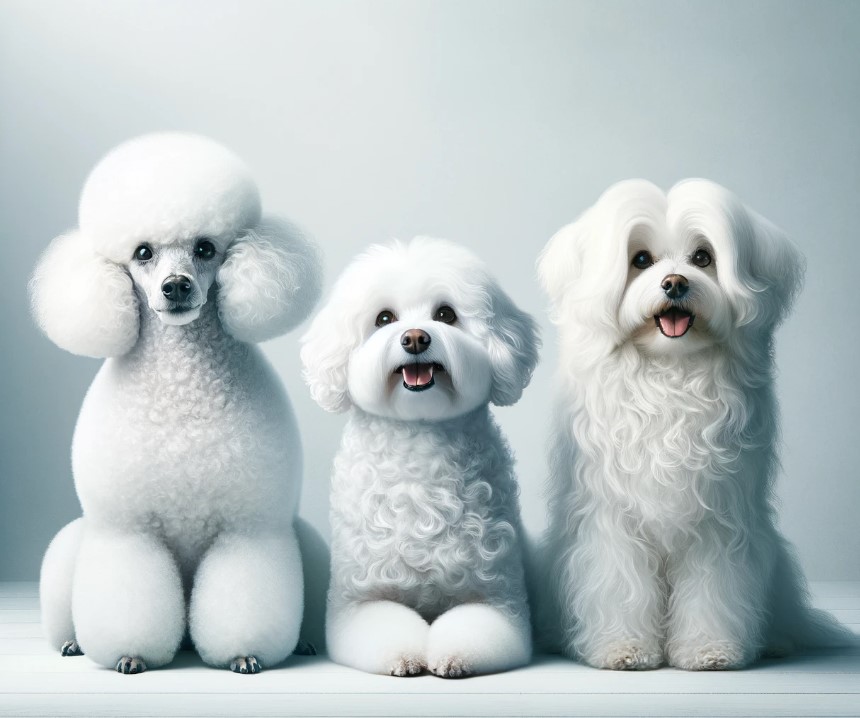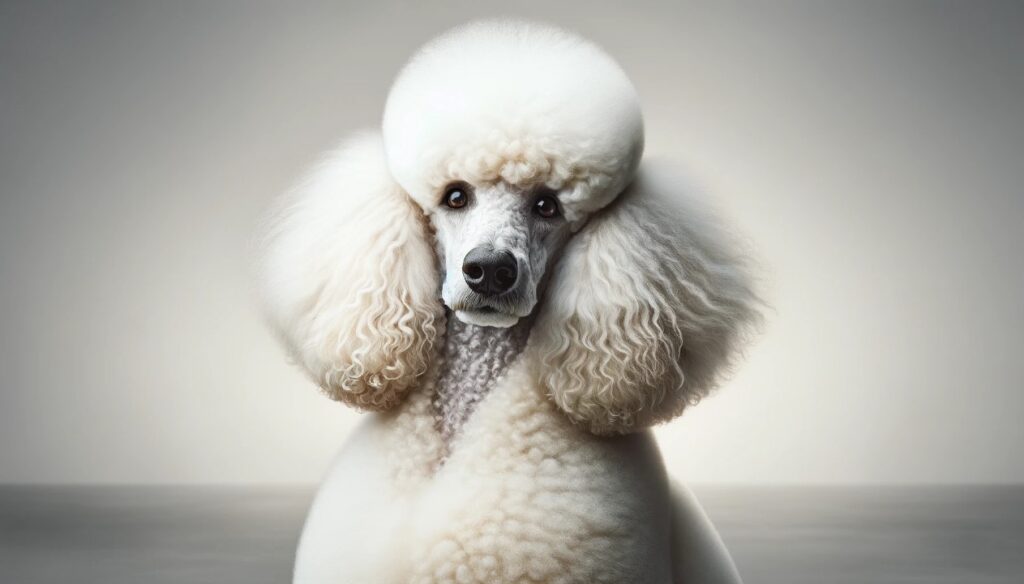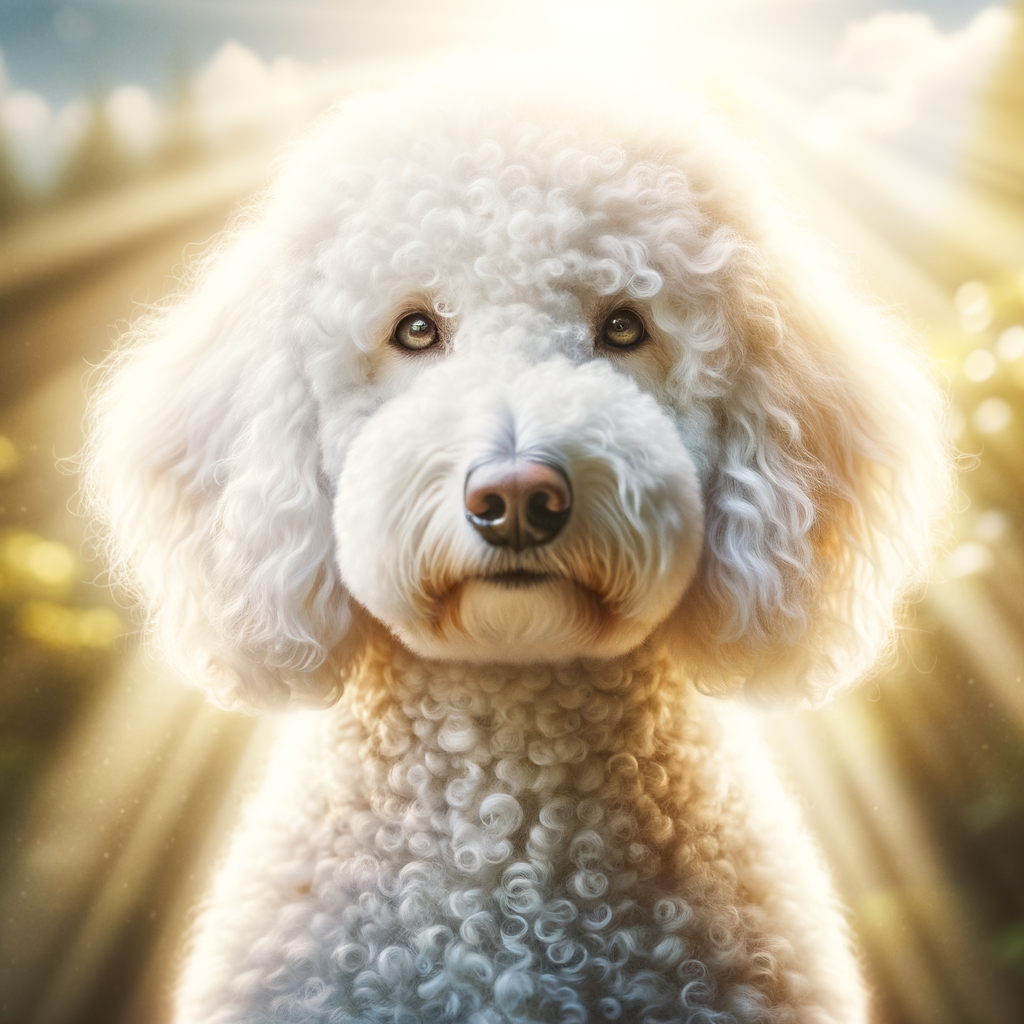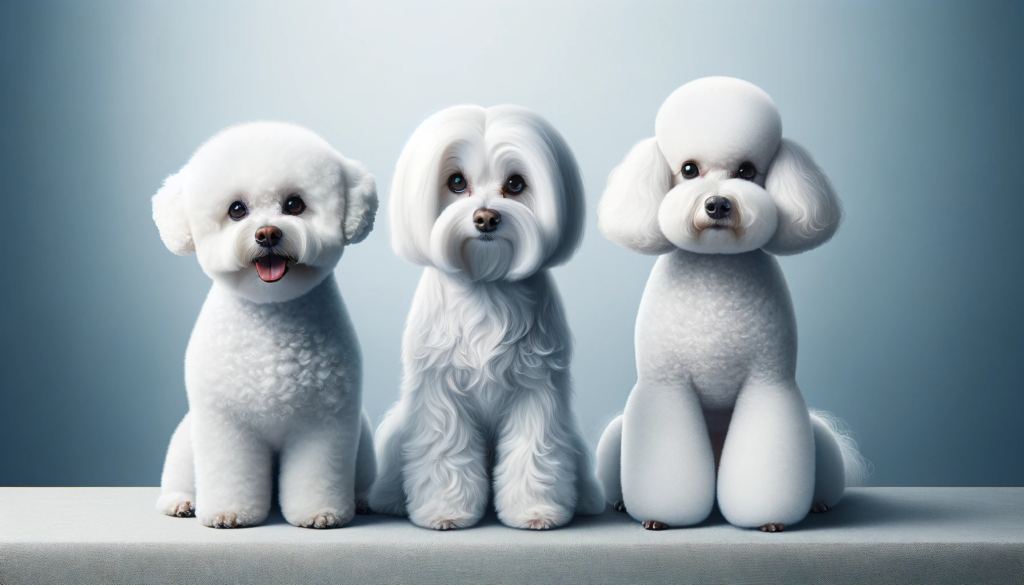Have you ever seen a white, curly-haired dog prancing down the street and wondered, “What lovely breed is that?” Well, I’m here to introduce you to the fabulous world of white curly-haired dog breeds. These dogs, with their fluffy, cloud-like coats and adorable spirals, are like the supermodels of the canine world. Their white fur gleams like fresh snow, and those curls are irresistible – they add a touch of elegance and a whole lot of cuteness. But did you know these curly coats and white hues aren’t just for show? They’re the result of fascinating genetics at work!

Indeed, the curly coat gene is one of the many wonders of canine genetics. It’s responsible for producing the tight curls and waves that make these breeds so distinct. Similarly, the white coat in dogs is due to a lack of pigment in their fur, giving them their bright, luscious color. Who knew that science could be so adorable?
Among the white curly-haired dog breeds are the Bichon Frise and Poodle. The Bichon Frise, a playful powder puff, is a small dog with a big personality and an even bigger hairdo. On the other hand, the Poodle, the classic curly companion, is known for its intelligence, elegance, and versatility in sizes.
No matter which breed you prefer, caring for a white curly-haired dog’s coat requires dedication. Regular grooming is essential to keep those curls looking their best, and specific strategies can help maintain a bright white coat. But it’s not all about looks – curly-haired breeds need special attention to their health, including preventative care to tackle common issues.
Training and socializing curly-haired dogs from an early age is crucial. They’ll need the right living environment, one that suits their energetic and playful nature. And if you’re thinking about adopting a white curly-haired dog, I’ll share some tips on where to find these breeds and how to prepare your home for a curly-haired companion. So, stay with me as we dive into the twirly, whirly world of white curly-haired dog breeds!
The Genetics Behind Curly Hair in Dogs
Get ready to take a fascinating journey into the world of genetics! Ever wondered why your adorable curl-coated companion sports a fluffy, cotton-like coat while others have straight or wiry hair? The answer lies in the genetic makeup of our four-legged friends. So, let’s delve deeper into the fascinating world of curly-haired canines and reveal some of the secrets of their unique, white curly coats!
Understanding the Curly Coat Gene
Curly fur in dogs is not a matter of sheer luck, but instead, it’s all about genetics. A particular gene, known as KRT71, is responsible for those curly, coiled, and wavy locks that we adore. When the KRT71 gene is mutated, it causes the hair follicles to produce curly hair instead of straight ones. So, if you’re fawning over those delightful waves or curls on your pooch’s coat, you can thank the KRT71 gene for this adorable feature. Among the various white curly-haired dog breeds, such as the Bichon Frise or Poodle, this gene makes an unmistakable mark.
On the other hand, not all dogs carrying the KRT71 mutation will have curly hair. That’s because the expression of this gene might be impacted by other genetic factors, leading to different coat textures even within the same breed. Isn’t genetics a thrilling field!
How White Coats Occur in Dogs
Just as with the curly coat, the pure snow-white fur of certain breeds is also a product of their genetic inheritance. Dog coat color is determined by two pigments – eumelanin (black/brown) and pheomelanin (red/yellow). The gene influencing the intensity of these pigments is MC1R, also known as the Extension gene. A variation in this gene results in a “recessive yellow” coat, wherein the eumelanin production is inhibited, leading to a coat with only pheomelanin pigment.
However, a white coat is more than just a lack of eumelanin. When pheomelanin is diluted due to another gene, the C-series or Albino series, it can result in a pure white coat in dogs. The white fur in breeds such as the Bichon Frise is most likely an outcome of this albino series of genes.
So you see, the signature white, curly coat of your four-legged friend is a result of a captivating interplay of several genes. Their unique coats are not just aesthetically pleasing but also a testament to the marvels of canine genetics. As you gaze upon your delightful, white curly-haired companion, remember, it’s a living embodiment of genetic art!
Remember, knowing about your furry friend’s genetic makeup is not just fascinating; it’s useful too. It helps you understand why they look the way they do, predict potential health issues, and even guide their grooming needs. So, the next time you run your fingers through your pet’s curly, snowy fur, you’ll appreciate not just its beauty but also the marvel of genetics that made it possible.

White Curly-Haired Dog Breeds: The Pooches with Pizzazz
When it comes to the world of white curly-haired dog breeds, there are two beautiful and popular breeds that often come to mind – the playful Bichon Frise and the classic Poodle. These dogs are not just adored for their charming looks, but also for their great personalities. Let’s delve a bit deeper into what makes these breeds so special.
Bichon Frise: The Playful Powder Puff
The Bichon Frise, often referred to as the “powder puff” for its fluffy white curls, is a small breed that’s known for its cheerful disposition and love of play. Here are some notable characteristics of this lovable breed:
- Appearance: Bichon Frises are typically 9.5 to 11.5 inches tall and weigh between 12 to 18 pounds. Their most striking feature is their thick, soft curly coat that’s pure white – a truly eye-catching sight!
- Temperament: They are playful, friendly, and great with children and other pets. Their outgoing nature makes them fantastic companions for families.
- Coat Care: Their lush white curls require regular grooming to prevent matting and staining. Expect to brush your Bichon daily and schedule professional grooming every 4-6 weeks.
Poodle: The Classic Curly Companion
Another popular breed that’s known for its white curly coat is the Poodle. These dogs are highly intelligent and come in three different sizes – toy, miniature, and standard. Here’s what you should know about Poodles:
- Appearance: Poodles come in various sizes, with the Standard Poodle being the largest, usually standing over 15 inches tall. Regardless of their size, all Poodles are well-proportioned, with a dense and curly coat that’s often groomed into distinctive patterns.
- Temperament: Poodles are known for their exceptional intelligence, making them highly trainable. They’re also friendly, eager to please, and get along well with children and other animals.
- Coat Care: Like Bichon Frises, Poodles require regular grooming to keep their curly coats in top condition. Poodles are also considered hypoallergenic, making them a good choice for people with allergies.
So, if you’re on the hunt for a pup with pizzazz that stands out from the crowd, these white curly-haired dog breeds could be the perfect match. Both the Bichon Frise and the Poodle offer a winning combination of good looks, great personalities, and plenty of love to give. Just don’t forget, their glorious coats require a little extra care and attention. But, for many, the joy these breeds bring makes the grooming efforts well worth it.
Caring for a White Curly-Haired Dog’s Coat
Caring for your white curly-haired dog’s coat is an essential part of ensuring they maintain their charming and unique appearance. Certain breeds like the Bichon Frise or the Poodle need not only regular grooming, but also specific grooming techniques to keep their curly coats healthy and bright.
Grooming Essentials for Curly Coats
Your white curly-haired dog will require a different grooming routine than other breeds. Curly coats are prone to matting and tangling due to the nature of their curls. Here are some must-have grooming essentials:
- High-quality dog brush: A slicker brush is perfect for these breeds. It has fine, short wires close together which helps remove matting and detangle hair.
- Dog conditioner: This helps to keep the coat soft and manageable, reducing the chance of tangles.
- Hair dryer: Drying your dog’s coat thoroughly after a bath prevents matting and skin infections.
- Professional grooming: Regular professional grooming sessions can help maintain the shape and health of your dog’s coat. It’s recommended for breeds like Poodles and Bichons to get a professional grooming every 4-6 weeks.
Tips for Maintaining a Bright White Coat
Maintaining the purity of your white curly-haired dog’s coat can be a challenge. Here are a few tips to keep your furry friend’s coat bright and white:
- Regular baths: Use a whitening shampoo specifically designed for white-coated dogs. These shampoos help to remove stains and discoloration.
- Diet: A balanced diet can impact the health of your dog’s coat. High-quality dog foods can enhance coat shine and color.
- Use a stain remover: Tear stains can cause discoloration on the fur around the eyes. Use a dog-safe stain remover regularly to keep these at bay.
- Stay on top of grooming: Regular brushing helps remove dirt and prevent matting, which can both dull the color of your dog’s coat.
Caring for a white curly-haired dog breed can be a bit more demanding than other breeds, but the reward is a stunning and majestic-looking companion. With patience, the right tools, and a consistent grooming routine, your dog’s coat will remain bright, healthy, and beautiful. Remember, a clean and well-groomed coat not only enhances your dog’s appearance but also contributes to their overall health and well-being.

Health Considerations for Curly-Haired Breeds
Common Health Issues in Curly-Haired Dogs
When it comes to white curly-haired dog breeds, there are a few common health issues to be aware of. These dogs are generally healthy, but like all breeds, they’re prone to certain health conditions. Not all dogs of this type will get any or all of these diseases, but it’s important to be aware of them if you’re considering this breed.
– Skin Conditions: Dogs with white curly hair are often prone to skin conditions such as allergies and dermatitis. This is due to the tight curls that can trap dirt and moisture, leading to skin irritation. Regular grooming and cleaning can help prevent these issues.
– Ear Infections: The curly hair can also extend into the dog’s ears, creating a warm, moist environment that is ideal for bacteria and yeast. Regular ear checks and cleaning can help prevent infections.
– Eye Conditions: Some white curly-haired breeds like the Bichon Frise and Poodle are prone to certain eye conditions, including cataracts and progressive retinal atrophy (PRA). Regular vet check-ups can help catch these conditions early.
– Joint Issues: Many curly-haired breeds are also prone to hip dysplasia and patellar luxation. Keeping your dog at a healthy weight and providing regular exercise can help prevent these joint issues.
Preventative Care for Optimal Health
Prevention is the best medicine when it comes to your dog’s health. Here are some tips to help your white curly-haired dog stay in tip-top shape:
– Regular Vet Check-ups: Regular vet visits are crucial for early detection and treatment of any potential health issues. Your vet can provide vaccinations, heartworm prevention, and flea and tick treatments to keep your dog healthy.
– Diet and Exercise: A balanced diet and regular exercise are key to keeping your dog healthy. Avoid overfeeding your dog and provide plenty of opportunities for physical activity.
– Grooming: Regular grooming is crucial for white curly-haired dog breeds. This not only keeps their coat looking its best, but also helps prevent skin conditions and ear infections.
– Teeth Cleaning: Dental health is often overlooked in dogs, but it’s an important part of their overall health. Regular teeth cleaning can prevent dental disease and other health problems.
Remember, every dog is unique and may have different health needs. Always consult with your vet about the best care for your specific dog. Owning a white curly-haired dog breed is a rewarding experience, and with the right care, these dogs can lead long, healthy lives.
White Curly-Haired Dog Breeds: The Pooches with Pizzazz
Training and Socialization for Curly-Haired Dogs
One of the most vital aspects of owning a white curly-haired dog breed is ensuring they are well-trained and properly socialized. This goes beyond basic obedience to include behavior in various social settings.
The Importance of Early Training
To ensure your fluffy companion grows into an obedient, well-rounded adult dog, early training is crucial. Both Bichon Frise and Poodles, two popular white curly-haired dog breeds, are known for their intelligence and often rank high in trainability. This means with patience, consistency, and positive reinforcement, your curly-coated companion can learn a multitude of commands and even some impressive tricks.
Keep in mind that starting early doesn’t mean pushing your puppy too hard. Respect their pace and make sure training sessions are always fun and rewarding. Make use of treats, toys, or simple praises to motivate your little furry friend. Also, remember that short, frequent training sessions are usually more effective than long, infrequent ones.
Socialization Strategies for Curly Coats
Socialization is another crucial aspect of raising a happy and confident curly-haired dog. Early exposure to a variety of people, places, sounds, and other animals can significantly enhance your dog’s social skills and help prevent the development of fear or aggression.
Here’s a quick guide to socializing your white curly-haired dog:
– Start by introducing them to family members and friends who visit your home frequently.
– Once they’re comfortable, take them to different environments like parks, pet stores, or dog-friendly cafes. This helps them get used to various noises, smells, and sights.
– Encourage positive interactions with other dogs and people. Always reward good behavior with praises, pets, or treats.
– Consider enrolling your puppy in a socialization class or a puppy kindergarten. These classes provide a safe, controlled environment for your pup to interact with other dogs under the guidance of a professional trainer.
Remember, socialization should be an ongoing process. Continue to expose your dog to new experiences throughout their life while always ensuring these experiences are positive and safe.
Training and socializing a white curly-haired dog breed might be challenging at times, but the reward of having an obedient and sociable pooch is priceless. So, embrace the process, be patient, and enjoy the unique journey of raising your white curly-haired companion.

The Best Living Environments for White Curly-Haired Dogs
There’s no denying the undeniable charm of white curly-haired dog breeds. But these lovely pooches need environments that match their unique needs. As a pet parent, it’s essential to know where your snuggly friend will thrive the most.
Indoor vs. Outdoor: Making the Right Choice
Many potential pet owners find themselves wondering whether their curly-haired companion would be better suited to an indoor or outdoor lifestyle. The ultimate decision depends on a variety of factors such as breed, size, temperament, and of course, coat type.
The majority of white curly-haired dog breeds, such as the Bichon Frise and Poodle, are small to medium-sized dogs. They are incredibly adaptable and can live happily in an apartment or house, provided they receive adequate exercise and stimulation.
Curly-haired dogs, particularly those with white coats, are more prone to skin issues. Their hair is more susceptible to matting, and their skin can be sensitive to harsh weather conditions. Therefore, these breeds are generally better suited to an indoor lifestyle, where they can be kept warm, clean, and mat-free.
Another important factor to consider is the white coat of these dogs. White fur can easily become stained or dirty when your pup spends a lot of time outdoors. An indoor environment can help keep their coats clean, bright, and beautiful.
Remember, it’s not about confining your dog indoors all the time. Regular outdoor activities are vital for their physical and mental health. But in terms of their living arrangements, an indoor environment is often the best choice for white curly-haired dog breeds.
Exercise Needs for Active Curly Breeds
While they may look like cuddly toys, white curly-haired dogs are an active bunch. They love playtime and require regular exercise to keep them fit and healthy.
Here’s what you should know about the exercise needs of some popular curly breeds:
- Bichon Frise: Known for their playful nature, Bichons need daily exercise. Walking and playing games are excellent ways to keep them active. However, they’re also content with indoor activities and can make the perfect lap dog when it’s time to wind down.
- Poodle: Poodles are intelligent and active dogs. They require daily exercise and mental stimulation. This could include walking, running, or playing fetch. They also excel in agility and obedience training, making them a versatile breed for various activities.
It’s important to remember that each dog is unique. While the breed can guide you, your dog’s individual personality and health will also influence their exercise needs. Keep an eye on your furry friend’s behaviour and adjust their activity levels as needed.
In summary, the best living environment for white curly-haired dog breeds is an indoor one with daily access to outdoor activities. They need regular exercise to keep them happy and healthy, so a balance of indoor and outdoor time is essential. As always, individual needs can vary, so getting to know your specific pet is crucial to making the best choices for their care.
Adopting a White Curly-Haired Dog
As a fellow dog enthusiast, I fully understand the allure of having a white curly-haired dog as a furr-fect companion. But now that you’re set on getting one, you might be wondering where to find these adorable breeds and how to prepare your home for them. Let’s dive right in and discuss these, shall we?
Where to Find White Curly-Haired Dog Breeds
Finding the perfect white curly-haired dog breeds might seem like a daunting task, but rest assured, there are various avenues you can explore. Here are few options to consider:
- Breeders: Reputable breeders are a fantastic source for purebred dogs like Bichon Frise or Poodles. However, remember to do thorough checks to ensure they’re ethical and prioritize the dogs’ health and wellbeing.
- Animal Shelters and Rescue Groups: Many lovely curly-haired dogs are waiting for their forever homes in shelters and rescue groups. Adopting from such sources not only gives a home to a needy pet but also discourages irresponsible breeding.
- Online Platforms: Various trustworthy websites and online platforms provide details of available dogs from both breeders and shelters.
Preparing Your Home for a Curly-Haired Companion
Once you’ve found your perfect white curly-haired pooch, the next step is to ensure your home is ready for them. It’s like setting a stage for the new star of the house!
Space: These dogs might be small, but they have a big personality! Make sure they have enough space to run around and play. An outdoor space like a backyard is a plus, but not a necessity. A few modifications inside the house can work wonders as well.
Grooming Essentials: Remember, the curly coat of your white dog will require regular grooming. Stock up on grooming supplies like a good-quality brush, dog shampoo, and conditioners.
Training and Play Items: Toys, training aids, and a comfortable bed are absolute must-haves. Toys will keep your pooch entertained, and training aids will help in the initial months of training.
Food and Water Bowls: Purchase dog-appropriate dishes for food and water. Consider anti-gulp bowls if you’ve got a fast eater.
Healthcare Arrangements: Last but not least, find a good vet in your vicinity. Schedule a check-up soon after adoption to ensure your new best friend is in good health.
A New Chapter with Your White Curly-Haired Dog
Adopting a dog, especially a white curly-haired one, is the beginning of an exciting new chapter in your life. These dogs not only bring bundles of joy but also become an important part of family memories. Their shimmering white curls add an extra dose of cuteness to their already irresistible charm.
As you embark on this journey, remember that every effort you put in, from the adoption process to preparing your home, will be rewarded tenfold with their love and companionship. And by choosing to adopt, you’re giving a home to a lovely furry soul. So, let the pizzazz of your new white curly-haired dog light up your life with infinite happiness.
Frequently Asked Questions
Q1: What are some popular white curly-haired dog breeds?
A1: Some popular white curly-haired dog breeds include the Bichon Frise, Maltese, Poodle, and the American Eskimo Dog.
Q2: How often should I groom my white curly-haired dog?
A2: The grooming frequency can vary depending on the breed. However, most white curly-haired dogs require regular grooming, usually every 4-6 weeks, to keep their coat clean and healthy.
Q3: Are white curly-haired dogs hypoallergenic?
A3: Some white curly-haired dogs like the Bichon Frise and Poodle are considered hypoallergenic as they shed less dander, which is what most people are allergic to. However, no dog breed is completely hypoallergenic.
Q4: What kind of temperament do white curly-haired dogs usually have?
A4: The temperament can vary greatly depending on the breed. However, most white curly-haired dogs are known for their friendly and playful nature.
Q5: How much exercise do white curly-haired dogs need?
A5: The exercise needs of a white curly-haired dog can vary depending on the breed and individual dog’s health and age. However, most of these dogs are quite active and require regular exercise to keep them healthy and happy.
Dr. Candy, a holistic veterinarian and certified raw dog food nutrition specialist, graduated from Oklahoma State University in 2009 with a DVM and has since specialized in companion animal nutrition, advocating for species-specific diets. With a background in wildlife rehabilitation and oil spill response, she combines holistic health and conventional medicine in her unique approach to treating chronic diseases, allergies, and autoimmune conditions in pets. As the owner of a veterinary practice in Colorado and an author, Dr. Candy is dedicated to educating pet parents and improving the health and happiness of animals.




